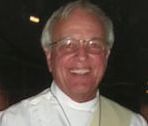It is certain that the end of the universe will not happen for tens of billions of years. It is also certain our own death will happen on a time scale of tens of years.
I believe there is a true and lasting hope of an afterlife and it can only rest in the eternal being of God himself.
When our bodies cast off our spirit, God does not just cast us off as discarded and broken, thrown on to the rubbish heap of the universe. Our belief in a destiny beyond our death rests in the loving faithfulness of the eternal God.
So. what happens? Who and what are we when we die?
Well let’s look at what we are now. We know that mind and body are intimately connected with each other. We are embodied beings.
Consider the real me, the real you, the ever-changing atoms, the material of our bodies, that are organized for each of us. Let’s call this “the unique pattern” of each of us.
It seems to me that God will remember this pattern of matter, unique for each of us. And in God’s great act of our resurrection, God will recreate that pattern, glorified, in a new environment, a new world.
Scripture speaks of the promise of “a new heaven and a new earth where death shall be no more, neither shall there be mourning, nor crying, nor pain any more, for the former have passed away”
God cares for all his creation. So, God must have a destiny for the universe beyond its death just as there is a destiny for us beyond ours. What would that look like for each of us?
There are clues in the Gospels of Jesus’ appearances. Jesus’ body before his resurrection becomes transformed and glorified after his resurrection. I believe we will be like him after our resurrection.
These accounts in the Gospels tell us how Jesus looked, spoke and what he did after his resurrection.
Jesus appears to Mary Magdalene. In the garden outside the tomb, Jesus is standing there. Thinking he was the gardener, Mary says, “Sir, if you have carried him away, tell me where you have put him, and I will get him.” Jesus replies, “Mary.” She turns and starts to embrace him. Jesus tells her, “Do not hold on to me, for I have not yet ascended to the Father.’”
Jesus appears to his disciples: “When the disciples are together, with the doors locked, Jesus comes and stands among them. He shows them his hands and side.”
Jesus appears to Cleopas and his companion as they are going from Jerusalem to a village named Emmaus. Jesus himself walks along with them. As they come to the village, Jesus continues on. They urge him to stay with them for the night. When he is at table with them, “Jesus takes bread and blesses and breaks it and gives it to them. And their eyes are opened, and they recognize him.”
Jesus appears to his disciples by the Sea of Tiberias. Jesus tells them, “Bring some of the fish that you have just caught. Come and have breakfast.” Jesus takes bread and gives it to them, and so with the fish.
Later, his disciples are gathered, and Thomas is with them. Although the doors are locked, Jesus comes among them, “Peace be with you.” Then he says to Thomas, “Put your finger here, and see my hands; and put out your hand and place it in my side.”
He presents himself alive to them, appearing to them during forty days and speaks about the kingdom of God. The eleven disciples go to Galilee, to the mountain. When they see him glorified and they worship him.
Jesus appears to Paul. As Paul approaches Damascus, suddenly a light from heaven flashes around him. He falls to the ground and hears a voice, "Saul, Saul, why do you persecute me?" "Who are you, Lord?" Saul asks. "I am Jesus, whom you are persecuting,".
So, Jesus’ glorified, full of God’s Spirit, tells Mary Magdalene not to touch him, appears through closed doors, breaks bread with his disciples, prepares breakfast, eats with his disciples, tells Thomas to put his hands into his wounds, appears to Paul as a blinding light and a voice heard.
Jesus is glorified, alive and active in Spirit and Body as he was then, is now and will be forever. Just as we will be. Our destiny is everlasting life. God creates life as a process in the way love works; as it is now and as it will be true beyond death.
Heaven will not be boring. Life will be the exciting and an inexhaustible exploration of the riches of life in God’s presence. The wounds of this life healed. Unfinished business completed. The dark side of our natures purged away.
Jesus promises us abundant life; life in its abounding fullness of joy and strength for mind, a body and soul glorified; a life that is our final destiny as part of God’s kingdom and as beloved children of God.
"I am come that they might have life, and that they might have it more abundantly."


 RSS Feed
RSS Feed